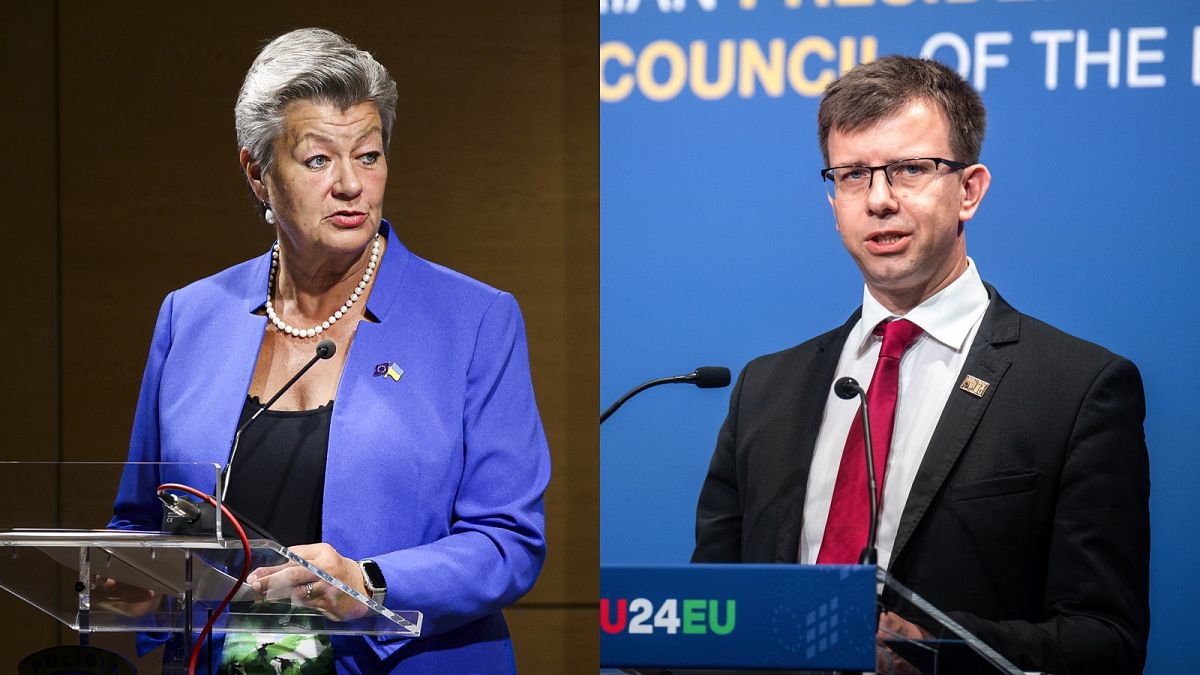The European Commission has sent a second letter to Hungary asking for further clarifications about its National Card scheme.
Brussels saw on Wednesday an exchange of conflicting narratives over Hungary's recent decision to extend its National Card scheme to Russian and Belarusian citizens, a move that has stoked fears of a backdoor for espionage and sanctions circumvention.
The scheme offers selected nationalities a simplified procedure to obtain work permits, with the option of family reunification. It lasts two years and can be renewed for an extra three years, paving the way for long-term residence.
The National Card was initially available only for Ukrainian and Serbian citizens. But in July, it was amended to cover Bosnia-Herzegovina, Moldova, North Macedonia and Montenegro, as well as Russia and Belarus. The news coincided with the diplomatic fallout of Prime Minister Viktor Orbán's controversial visit to Moscow.
For Ylva Johansson, the European Commissioner for Home Affairs, the inclusion of Russia and Belarus raises "serious" concerns and represents a potential threat to the security of the "entire" Schengen Area, she said on Wednesday during an hour-long hearing in the European Parliament focused on the hot-button issue.
Johansson openly questioned the logic of treating two "hostile" nations the same way as six candidates to join the EU and said the economic gains of bringing in guest workers from Russia and Belarus appeared "limited" and "disproportionate" compared to the internal risks, citing recent instances of sabotage, espionage and cyber-attacks.
In the summer of 2022, the EU suspended its visa facilitation agreement with Russia and agreed to intensify scrutiny over the future applications submitted by Russian visitors. The measures led to an 88% drop in visas issued for Russian nationals, Johansson said, and additional initiatives might be needed in the following months.
"This is a time for vigilance, not less. This is not the time to be soft on security," she said. "In Schengen, we must keep each other safe."
Johansson, however, underlined her services have not identified a violation of EU law and therefore would not launch legal action against Orbán's government – at least not until the internal assessment is finalised.
The Commission is still looking into the answers provided by Budapest in reply to a letter sent on 1 August. Hungary's answers left some aspects "unclear," Johansson told MEPs, and a second letter has been sent to clarify two aspects of the National Card scheme:
- Why does Hungary consider the extension to Russian and Belarusian citizens necessary and appropriate in the current geopolitical context?
- Why does Hungary not apply differentiated security checks on Russian and Belarusian applicants despite the increased security risks?
The deadline to reply is 11 September.
Asked if the changes to the National Card scheme merited Hungary's expulsion from the Schengen Area, Johansson trode carefully. "Suspension of a member of the Schengen area is a very, very big decision and I can't really see that this is coming," she said.
Budapest decries 'political hysteria'
A few hours before the Commissioner appeared before lawmakers, János Bóka, Hungary's minister for European affairs, gave a pre-emptive press conference and painted a diametrically different picture of the situation.
Bóka said the extension of the National Card to Russian and Belarusian citizens was needed to palliate labour shortages in the Hungarian market and give employers an "easier procedure" to attract foreign workers. The minister insisted the changes were compatible with EU law and did not water down entry and visa requirements.
Regarding the timing of the announcement, coming on the heels of the meeting between Viktor Orbán and Vladimir Putin, Bóka said it was "strictly a coincidence."
"The National Card system does not pose any national security, public safety or public order risks for Hungary or the European Union," Bóka told reporters.
"The National Card system contains certain facilitations related to employment. It complies with the rules related to visa issuance and entry in all respects."
Since the extension came into force in July, Hungary has granted 10 permits for Russians and four for Belarusians, Bóka said to quell anger. (The small number was later used by Johansson to challenge the rationale behind the extension.)
Throughout the press conference, the minister decried a case of "political hysteria" created by the European Parliament and "certain" member states, which he did not name. Last month, Baltic and Nordic penned a joint letter warning Hungary's recent actions "may constitute a serious security risk."
The Commission, Bóka said, should be "strong enough to resist political pressure" and leave matters of national security in the hands of intelligence experts.
Speaking by the minister's side, Fidesz MEPs András László and Kinga Gál denounced the criticism levelled at the government as "groundless claims," "malicious disinformation" and "yet another hypocritical attack" against Hungary.
The new clash between Brussels and Budapest is happening in parallel to another dispute related to a €200 million fine imposed by the European Court of Justice, which Hungary has so far refused to pay.












